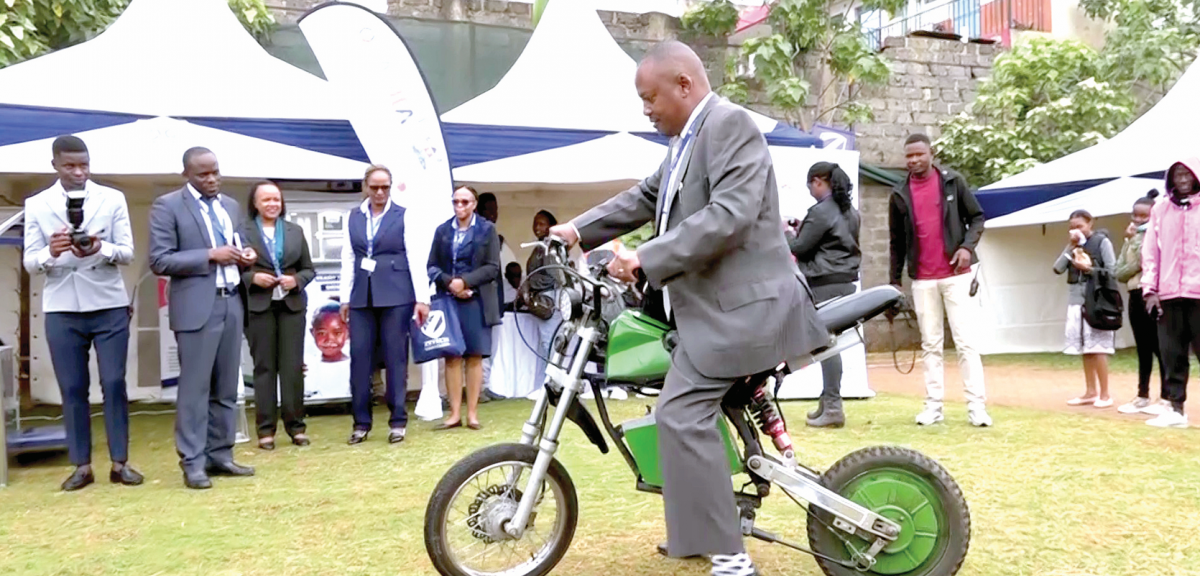Roar of electric engines mark new transport era
By Mathew.Ndungu and Oliver Musembi, July 28, 2023As the government gradually rolls out the use of electric motorcycles to reduce transport costs and make their operations easy, researchers and innovators at Zetech University are set to cash in from the development after they came up with technology meant to modify motorbikes to use electronic energy.
Recently, President William Ruto announced his government will introduce electric motorbikes and motor vehicles to ease and improve the mode of transport through powered rechargeable motorbikes instead of petrol-powered engines.
Zetech University researchers are set to benefit in the transition to electric motorcycles that not only promotes affordability but also presents a cleaner and more environmentally friendly option, eliminating exhaust emissions and noise pollution.
In an initiative spearheaded by researchers Paul Waweru and Prof Gitau Kamau, the innovators have also developed Tuk Tuks (rickshaws) that use similar technology in a move that aims to help operators cut down on the skyrocketing cost of fuel.
Waweru and Kamau noted that their innovation targets persons in the transport business, specifically boda boda riders and Tuk Tuk drivers and other people in the Jua Kali sector.
Speaking during the varsity’s 5th Research and Innovation conference held at Zetech’s Ruiru campus, the researchers noted that electric bikes require less energy to operate compared to their fossil fuel-powered counterparts, boast longer lifespans, and require less maintenance.
They stated that besides the motorbikes, they are collaborating with investors and banks to find ways of financing mass production of the electric motorcycles and Tuk Tuks.
“Our current business model is to convert boda bodas, especially those whose engines stopped working, into electric bikes. We change the engine by fitting in a new electric kit which extends the lifespan of the bike, electric bike’s consumption is much lower as compared to those that use fuel and this makes operational costs of motorbike operators much lower,” said Prof Kamau.
“By shifting to immobility, we also help conserve the environment. For every litre of petrol not used, we are saving 2.31kg of carbon monoxide that would have otherwise been emitted to the ecosystem,” noted Waweru.
Costing between Sh50,000 and Sh100,000 to convert a gasoline-fueled bike into electric, operators are set to enjoy a wide-range of benefits including low operation costs, durability of their tools of operation among others.
The idea of green motorcycles and vehicles has significantly gained traction worldwide with most countries now making efforts to revamp their locomotive sectors with a more efficient, affordable, and profitable means of transport.
Already, some Matatu Saccos within Thika and Nairobi areas have introduced electric buses with the aim of reducing fuel consumption and carbon emission and which most of them describe as less costly to maintain when fully charged as they can operate the whole day without recharging.
Use of electric tools of mobility comes at a time when the country is grappling with tough economic times and with the high cost of living, players in the transport sector believe solutions such as electric motors will help make life a bit bearable.
Deputy vice-chancellor Prof Alice Njuguna said besides other innovations in ICT, the institution is finding ways of recycling e-waste and developing software to test soil temperature and other components.
The university, she said, has been changing its curriculum depending on market demands to help prepare and fully equip learners to bravely face the market.
She maintained that higher learning institutions must embrace the art of teaching learners on market dictates including accommodating technologies in their training and not just theoretical lectures.
“It is our role to provide linkage to our innovative students and the viable market for commercialization of their products. As a university, we have a responsibility to participate in social-economic developments in our areas by way of finding solutions to the challenges facing the society through innovations,” said Prof Njuguna.
“As universities, we must come to terms and adapt the technology we are in. We must stop the old-age curriculum that does not solve the contemporary challenges facing the world. Here at Zetech, we have introduced artificial intelligence to ensure that once our students are done with classwork, they are able to come up with new products without much hustle,” added the DVC.
